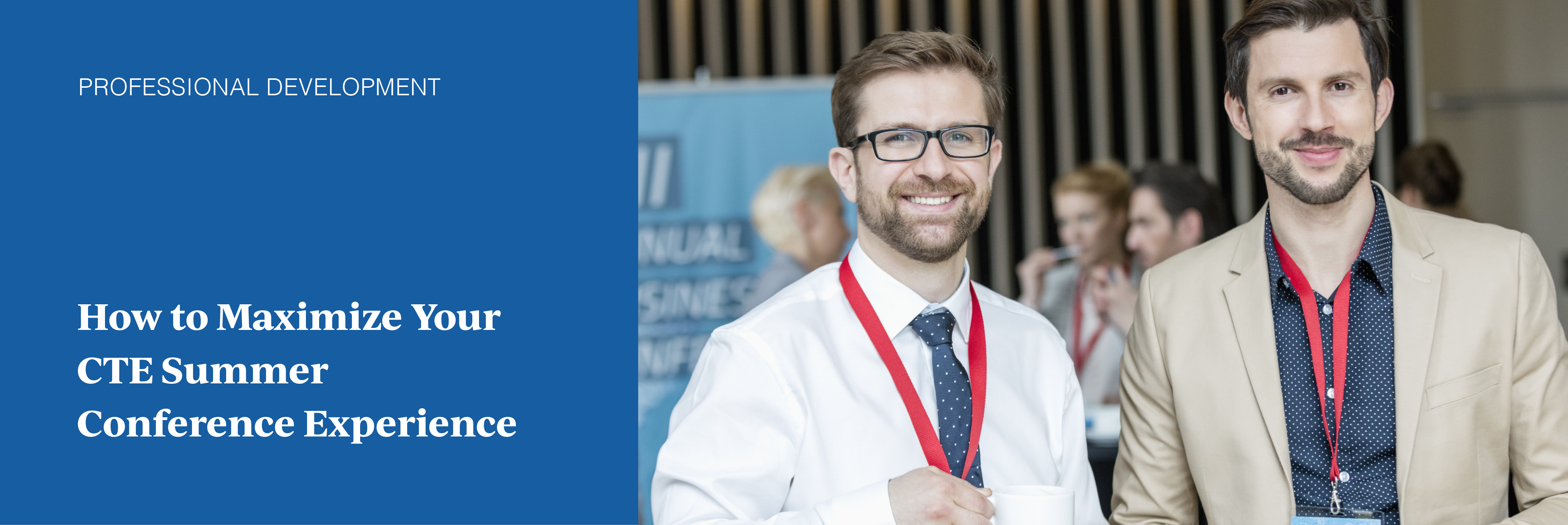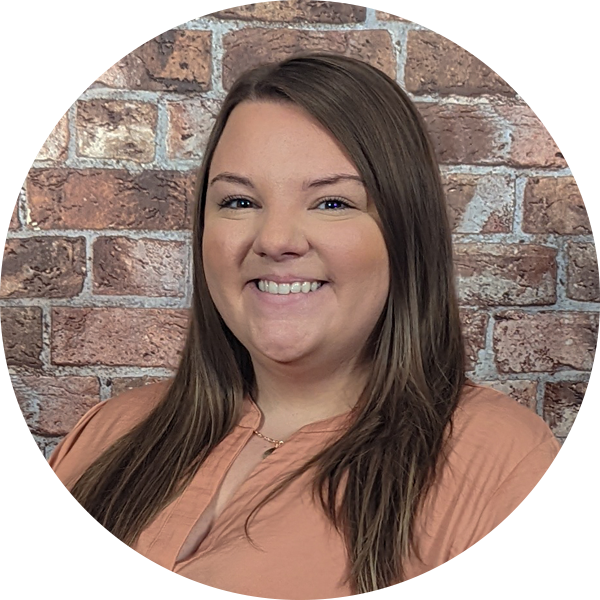How to Maximize Your CTE Summer Conference Experience
McKenna Garrison joined the iCEV marketing team in 2022 as the Content Marketing Specialist. Originally from a small town on the Gulf of Mexico, Garrison attended Texas Tech University from which she graduated with a B.A. in Public Relations & Strategic Community and an M.A. in Mass Communication & Media Studies. Garrison looks forward to bringing more of a storytelling element to iCEV social media pages. She also hopes to connect other CTE educators from around the country to the incredible curricula and resources iCEV has to offer.
As a CTE educator, understanding the importance of lifelong learning is paramount not only for your students, but for yourself. And one of the best ways to continue learning throughout your life is to attend CTE conferences.
At these conferences, you’re able to connect with other educators from all over the country, learn more about hot topics within the industry and get inspiration for the upcoming school year.
However, attending conferences isn’t just about showing up and sitting in on a few sessions. As a CTE curriculum provider, we often hear from teachers like you who want tips on how to get the most from the events they attend.
In this article, you'll discover how you can maximize your summer conference experience to reap all the benefits available from these valuable opportunities.
Pre-Conference: Preparation is Key
Oftentimes, the key to a successful summer conference is to prepare ahead of time. After all, you wouldn't teach a lesson without a lesson plan, so why should you attend a conference without a game plan?
In this section, you'll learn several tips on how best to prep yourself for a conference.
1. Determine Your Goals
Most of the time when you decide to attend a conference, it's best to have a list of goals in mind that you’d like to accomplish while you're there. This list will help you focus your time at the conference so you can get out of your attendance everything you want to.
Some of your goals could be:
- Networking with one or more of your peers in the education field
- Learning more about a specific topic or subject
- Finding inspiration for a project you're working on
No matter what your goals are, however, be sure to make them specific and attainable. Don't stress yourself out by listing goals that are too vague or impossible to meet. Instead, a one or two simple goals will serve you well and let you walk into the conference knowing what you’d like to take away from it.
2. Do Your Homework
Another way to prepare yourself is to research the conference ahead of time and create a schedule of events and activities that directly impact the goals you've chosen.
This research could take several forms. For instance, if you’re interested in attending sessions, try to watch videos of the speakers or dive into the topic to determine if the session would be a good fit for you.
On the other hand, if you’re looking to network, find events happening during the conference and after-hours happenings to give yourself the best chance to meet new people. Just don’t forget to schedule some time to rest and unwind!
The conference website is a great place to start to find valuable information like this, from conference maps, to lists of events, sessions and even attendees who could be good contacts.
Additionally, once you’re at the conference you want to make sure you’re ready for whatever the day brings. To prepare, have a way to collect new connections’ contact information and have a way to give out your contact information.
Hint: LinkedIn has a QR feature that makes connecting simple and easy!
3. Unplug from Work
One of the most common ways teachers end up losing out on their conference experience is by worrying too much about work while attending---in short, neglecting to successfully "unplug" from work.
Taking in large amounts of information is already a difficult task. When coupled with stress or anxiety from work, however, it can be even more difficult to process all that you’re learning.
To ensure work doesn't interrupt your conference, here are some tips to help you unplug:
- Complete any paperwork you need to take off for the conference
- Wrap up any lingering projects
- Set your out-of-office response ahead of time
- Let your colleagues know you'll be unavailable
- Try not to think about your work duties while attending conference events and sessions
Of this list, the last tip is the trickiest to pull off. It's probably in your nature to worry about work when you're not there. However, you have to remember that this is time you've taken off and dedicated to growing as a person, and that means something. Don't spoil your experience---focus on what matters when you're at your conference, rather than things beyond your control.
4. Have Fun
Conferences are intended to be fun, so remember to enjoy yourself!
While making goals and a schedule can keep you on track, don’t be afraid to choose something enjoyable over something on your schedule. For example, if you decide you'd rather miss out on an event in favor of having lunch with some new friends, go for it!
CTE conferences are meant to help you grow as a person and a professional, and any fulfilling experience you can have will take you a step further on that journey. In other words, be flexible and go easy on yourself!
Post Conference: Reflection is Necessary
Now that you've had a successful conference where you learned what you wanted and had some fun along the way, the next step is to reflect on your experience. This will help you better absorb information from the conference and come away with more concrete gains.
In this section, you'll learn some strategies to better reflect on your summer conference experience.
1. Follow Up
Many teachers make great connections at conferences, but afterward fail to follow up with any of their new contacts. This is a mistake. After all, many of these connections could turn into mentors, future colleagues or even lifelong friends. But all that potential could fizzle out if you never speak to them again.
Instead, if networking was a goal of yours and you forged strong connections during the conference, don’t forget to keep the conversation flowing with a follow-up email or thank you note. This will help keep you fresh in your new contact's mind, and may lead to greater things down the line.
Try thanking your new contact for taking the time to speak with you at the conference, or asking them a question that you think would prompt a conversation. However you choose to form your follow-up, though, remember to keep it brief and to the point.
2. Brain Dump
You’ve probably ingested a lot of great information during your conference, but once you go home, it can be easy to draw a blank and forget all but the broad strokes of everything you've learned.
To counteract post-conference forgetfulness, try a brain dump. This is where, either back in your hotel room or at home, you review your notes and write down any information you feel is important to hold on to.
Some of the things you could write down include:
- Your main takeaways
- Any action items you want to pursue
- Topics you want to research or learn more about
- Conversations you've had with new connections, along with their contact information
This brain dump gives you a way to organize all of this essential information in one place, so you don't forget anything later on. Just be sure to do this when the events of the conference are still fresh in your mind, so you can make your notes as accurate as possible.
3. Reflect
After you've written down the info you gained from the conference, what comes next is to sit down and reflect on your most important takeaways. It’s critical to make sense of your experience to understand the value you personally gained from attending.
Some questions you can ask yourself to reflect on your experience include:
- Which speakers inspired you, and why?
- What new skills, if any, did you learn?
- Did you make any meaningful connections with new colleagues?
- What was your most valuable takeaway, and why?
- Did you meet your goals? If yes, was did you gain from doing so? If no, what can you do better next time?
Take some time and think about how you would answer these questions. This is meaningful reflection that will help you meditate on all you've gained, and determine which of these gains is most important to you.
In addition, by taking the time to determine how the conference impacted you, it helps create a game plan for next steps.
4. Take Action
Now that you've reflected upon your experience and better absorbed the knowledge you've gained, what comes last is to put that knowledge to good use!
First, you should share what you learned! You can share your takeaways with your boss, colleagues or even on social media like LinkedIn. Sharing your insights is a great way to not only articulate the value of the conference, but also to spur conversations with other conference goers or even your own team members.
Second, determine actionable items from your reflection. Were you inspired to start a CTSO at your school? Then get started! Do you want to learn more about a topic in education? Get to researching! Conferences continue to add value the more you dig into the insights you gained while attending.
Lastly, find your next conference! Now that you’ve maximized this conference, continue to be a lifelong learner and keep digging for new information, ideas, and experiences.
Need More Professional Development Opportunities?
In this article, you've discovered some of the best strategies out there for maximizing your summer conference experience. Using these tips, your conferences will hit harder and have more lasting effects on your professional growth and learning.
However, conferences are only one way to gain professional development, and are too few and far between for most teachers. If you need steady, reliable, and easy-to-access professional development opportunities, then check out iCEV's Webinar Series!
These helpful webinars are designed to teach you essential concepts, hone your skills, and help you keep up with the latest topics in education:


